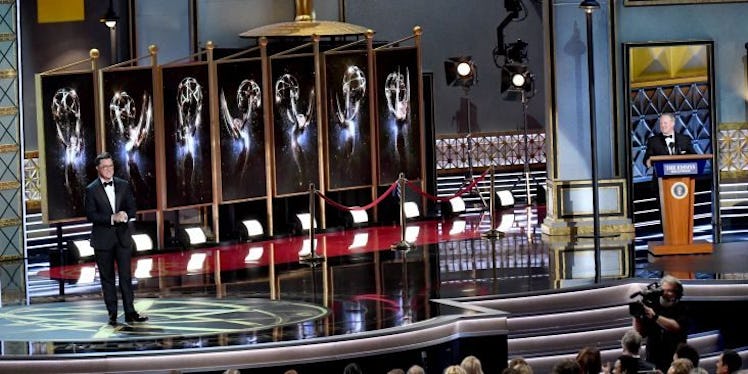
Emmys Ratings Were At An All Time Low & We Probably Can Guess Why
Last night's Emmy Awards viewer numbers are in and it's... not good news for CBS. The 2017 Emmys ratings pulled in 11.38 million total viewers, and a 2.5 rating, which is on par with last year. The problem is, last year's was the all time smallest audience ever. What gives? Do people just not want to watch fabulously rich people dressed in clothing that costs more than their cars congratulate each other, and occasionally rant about the environment?
Don't be silly! Of course people love to tune in and watch such things. The Oscars and the Golden Globes are proof of that, not to mention all the other endless awards programs that seem to air over the course of the year. So why can't the Emmys get the same respect?
It's not a respect thing that makes audiences tune out. Nor, despite all the protests to the contrary that you'll see in the next few days, was it the politics. Not to say this year wasn't political. It was, startlingly so, far more so than any year in recent memory. Not just in Colbert's sketches, but also the awards given out, and the speeches by those who accepted them.
Alec Baldwin announced he'd won Trump's Emmy. Donald Glover straight out said thank you to Donald Trump, because his win was a partial reaction to the president's behavior. SNL took home practically every award they were eligible for for their political sketches. The Handmaid's Tale won trophy after trophy for their luck in being the Most Accidentally Relevant Series Of 2017.
But that brings us to the real issue at hand. The Handmaid's Tale was the biggest winner of the night. It aired on Hulu, which up until last night was the third of of the "Big Three" streaming channels, behind Amazon and Netflix. For those who actually sit down and watch TV at home every night, it's not a show that is even available. Even if they watch Hulu as a way to stream network TV, it's still not available, because you need Hulu Plus.
It is a truth universally acknowledged at this point that network ratings are sliding badly year to year. But that's comparative numbers versus the stranglehold monopoly they used to be afforded in until just the last decade. A perfect example: when they cancelled American Idol on FOX in 2015, it was because it had slid to 16.8 million viewers, down from the from the 38.06 million of the show's heyday.
You can't argue that's a helluva drop. But compare that to the numbers pulled in by HBO's Game of Thrones Season 7 finale, their highest rated show ever, that holds all the records for HBO most watched programming ever: 12.1 million.
Do you see where we're going with this? Game of Thrones, HBO's most watched program ever, is still barely 2/3rds of a network program that gets cancelled for "ratings collapse." Now, look at the nominations numbers: HBO had (we're not kidding) 111 nominations, none of which are programs that came even close to Game of Thrones ratings. The only one who did was Westworld, and it left empty handed.
We don't know Netflix's rating numbers, they won't tell us. But we can bet they're not far off from HBO. They had 93 nominations... for shows that only tiny slivers of the at home audiences watch. Their biggest show? Stranger Things. Like Westworld, it too walked out empty handed.
Meanwhile, the channel that had the biggest audience share of the broadcast nets, CBS, was completely shut out last night. They had all of seven nominations, tied with Hulu. Left empty handed, while Hulu walked out with 5. ABC? 11 nominations, no wins. Fox? The CW? Not even in the running last night. All their nominations and wins were relegated to the Creative Arts Emmys the weekend prior. FOX's spin off channel, FX, walked in with 27... walked out with 2, both won by Donald Glover and Donald Glover's Amazing Purple Suit. Only NBC had a good night, mostly on the back of SNL.
When the programming that the majority of America is watching isn't the programming being awarded, or even considered by the Television Academy, this is the sort of audience disconnect that happens. This may be a time of "prestige TV," but when what you're awarding is the stuff that's not being seen, audiences don't have much of an incentive to tune in and cheer on their favorite actors.
As long as the Emmys decides that "prestige TV" is what it wants to consider worthy of awarding, then we should not be shocked that "prestige TV ratings numbers" are what they'll continue to receive. That's not politics. That's common sense.